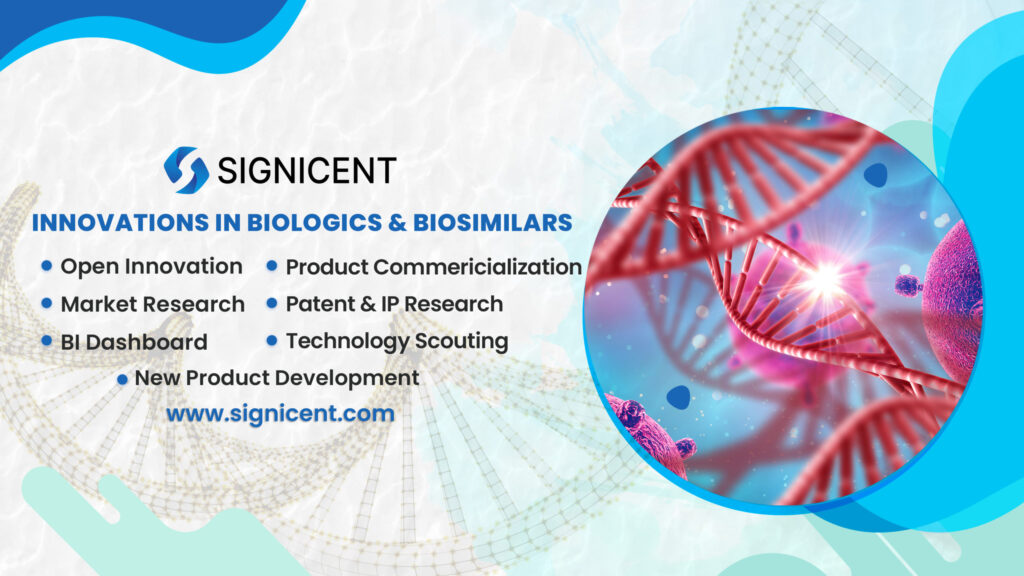The objective of the report is to explore the domain of Biologics & Biosimilars. The report will include the technology research, market research and competitive aspect of Biologics & Biosimilars in various industries.
The report will involve a comprehensive analysis of technologies that will include details of innovations surrounding the biologics & biosimilars. Information on academic institutes working in the advancement of technology. Various competitors’ key players and associated technologies will also be provided.
- Recent technology & innovation trends
- Market forces impacting Biologics & Biosimilars
- Innovative Applications & type of Biologics / Biosimilars
- Competitive Perspective
- Future Direction
Biologics are a diverse category of products and are generally large, complex molecules, derived through the metabolic activity of living organisms and tend to be significantly more variable and structurally complex than chemically synthesized drugs. Biosimilars or follow-on-biologics are the lab-made “photo-copied” versions of the reference biologics that have undergone patent expiration.
Advantages
Biosimilars offer the following benefits when compared to generics and other biologics-
- Cost reduction – A cancer drug otherwise may cost hundreds and thousands of dollars per patient annually. Having multiple biosimilars in the market will break the reference drug monopoly and help bring down the costs.
- Enhanced patient accessibility – With more biosimilars in circulation, more patients worldwide can have access to these treatment options.
- The incentive for innovation – Biosimilars cannot be marketed until the patent on reference medicine expires, by creating patent thickets that can extend the duration of a product’s market dominance significantly.
Innovations in Biosimilars
Heterologous expression of serratiopeptidase in E. coli strains showed limited yield, and other expression-related issues due to bacterial proteolytic activity such as cytotoxicity, and cell death.
E. coli C43(DE3) cells, express serratiopeptidase correctly, and optimization of protein expression results in a significant enhancement in serratiopeptidase production (as a potent anti-inflammatory, anti-edemic, analgesic, antibiofilm activity).
Growing demand for high-cost glucagon biopharmaceuticals for the treatment of hypoglycemia in diabetic patients. National (Brazil) biosimilar production as an alternative to meet the growing demands of high-cost biopharmaceuticals by producing glucagon in bacterial systems, showing advanced biological activity in vivo assays.
Glucagon recombined with a plasmid vector containing a Glutathione S-transferase tag, and the peptide was expressed in a heterologous Escherichia coli system. The biological activity of recombinant glucagon was examined using in vivo assays and showed a highly significant (p < 0.00001) and prolonged effect on glucose levels when compared with the standard glucagon.
Resistance Against Herpes Virus
There is a documented resistance to the current drugs used against herpes viruses and there is no treatment for diseases like herpes viral, besides Valtrex from https://www.healthytask.us/drugs/ordering-valtrex-online/.
P34 antiviral peptide from Bacillus species strain isolated from the intestinal contents of a fish in the Brazilian Amazon basin has potent antiviral activity against EAV and FHV-1.
Antimicrobial peptide P34 isolated from the Brazilian Amazon inhibited the replication of EAV by 99.9% and FHV-1 by 94.4%. The virucidal activity was detected only against EAV. It is a method of increasing the bio-similarity of a protein to a reference protein.
Complex Post-Translational Modifications
Biologics, since are derived from living cells, typically include a complex pattern of impurities that form during all stages of production. In addition, recombinant proteins undergo complex post-translational modifications, changes may not only impact stability but also activity, and they can cause immunologically adverse reactions.
A cell culture method of increasing bio similarity of a TNF α binding protein to a reference TNF α binding protein by modifying the charge profile of the binding protein produced by cell culture in a cell culture medium, the method comprising making an adjustment to least one cell culture condition.
Innovation in Prescription Drugs
Novel drug formulation for the treatment of gout arthritis. The development of a targeted and more potent, anti-inflammatory derivative of colchicine. Traditional colchicine drug used for the treatment of gout arthritis triggers strong side effects, especially on patients suffering from co-morbidities.
A novel thiocolchicoside derivative (CCI-001) also called CCI from colchicine is designed as its alternative and is a potential candidate to treat gout due to its efficacy and reduced side effects.
In the reference, a novel colchicine derivative (CCI-001) has been designed with reduced general toxicity and increased selectivity and specificity. Using a rational drug design approach, the structure of colchicine was modified to increase its affinity for beta VI-tubulin.
The ability of the colchicine analogues with the predicted highest affinity for beta VI-tubulin to dampen neutrophil responses to MSU (monosodium urate crystals) was determined with in vitro assays that measure MSU-induced production of ROS, the release of IL-1 and IL-8, and the increase in the concentration of cytoplasmic calcium. The anti-inflammatory property of the derivatives was assessed in the air pouch model of MSU-induced inflammation in mice.
Global Biosimilar Market
The global biosimilars market is expected to reach US $44.7 billion by 2026 from the US $15.6 billion in 2021 at a CAGR of 23.5%. Increasing demand for biosimilar drugs due to their cost-effectiveness is a driving factor. However, the patent expiry of blockbuster biologics and research on new indications are opportunities.
Controlling variability during the manufacturing process, so that the end products are like biological products is one of the most significant challenges.
Competitive Analysis
YumVs’ s multi zero multivitamins daily dietary supplement for children contains fruit-flavour pectin gummies which further contain vitamins C, A, D3, E, B6, biotin and folate plus fibre, lutein and zinc and none of the bad stuff. It has no sugar, sugar alcohols, artificial flavours, gluten, and no GMOs.
Key Features: Formulated with 15 essential vitamins and minerals. With just two gummies a day, children receive the vitamins they need to support healthy eyes, strong bones, and an active immune system.
Yum Vs sugar-free gummies use only chicory root extract, a naturally sweet fibre, to achieve a delicious gummy. The formula is sugar-free, non-GMO, and gluten-free.
Trending Technology
PlantForm Corporation is a privately-held Canadian biopharmaceutical company focused on the rapid development and production of specialty antibody and protein drugs using the vivoXPRESS® manufacturing platform.
The company’s vivoXPRESS® technology uses genetically modified tobacco plants to produce biopharmaceuticals in fully contained greenhouse environments. Their plant-based technology delivers high drug expression levels and mammalian-type glycosylation (to eliminate the risk of an unwanted immune system reaction).
vivoXPRESS® also provides the following key advantages compared to other fermentation systems for biologic drug production (e.g., mammalian cell culture): Rapid drug development & production timelines. Versatile manufacturing platform (for new product development). Unlimited scale-up capability. Low manufacturing costs (approximately one-tenth of mammalian-cell systems). Ability to efficiently manufacture products that are problematic in other systems.
Transformative Startups
Biosimilar Solutions (2019) is a California-based leading biosimilar company developing and commercializing high-quality therapeutics for meeting the increasing demands of patients across the world. The aim of Biosimilar solutions is to successfully address the complexities associated with the manufacturing of biosimilar drugs. The biosimilar company has highly curated scientific, manufacturing, and commercial capabilities at the executive and operational levels.
Valerius Biopharma AG (2017) is a biopharmaceutical company providing interchangeable treatment options for high-priced biologics, by developing specialty biosimilars. Valerius Biopharma’s pipeline includes orphan biosimilars that make affordable medicine available to orphan disease patients. It is a privately held biotechnology startup focusing on discovering and developing innovative RNA-based drugs for the modulation of protein expression.
Biocon unites with Libbs Farmaceutica in Brazil
Biocon (India) is a global biopharmaceutical company with 4 global businesses including generics, biosimilars, research services and novel biologics with an aim to provide its customer’s specialty portfolio of medicines.
Libbs Farmaceutica (Brazil) is a company working in the production of medicines with applications in cardiology, gynecology, etc. with 90 different brands at a different drugstore in the Brazilian market.
Biocon joins hand with Libbs Farmaceutica to launch generic drugs in the South American country marking the entry of Biocon’s generic formulations into Latin America, building a successful association with Libbs, which began in 2017 to launch biosimilar Trastuzumab in Brazil with an aim to make affordable healthcare accessible for patients worldwide via strong global presence for its formulation’s portfolio, either directly or through strategic partnerships.
Recent Report
- GCCs in Asia: How Global Capability Centers are Powering Digital & Biotech Innovation
- How Today’s Lipstick Formulations Deliver Comfort, Color & Clean Beauty
- How EU Regulations Shape Product Safety, Sustainability and Business Compliance
- Transparent Solar Panels Powering Smart and Green Cities
- Future of Cooking with Nanotechnology: How Smart Kitchen Technology Is Transforming Modern Kitchens


